Father of Slain Protester Wins International Human Rights Award
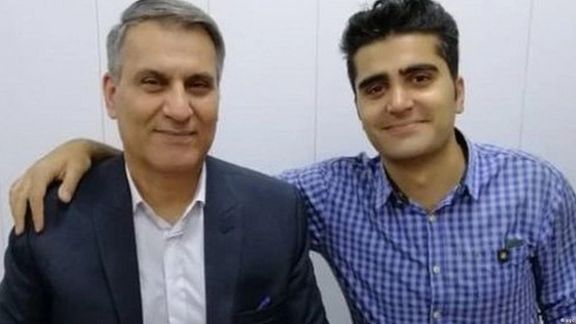
An Iranian activist who has campaigned for justice for victims of the Islamic Republic since the death of his son in a protest has been given an international human rights award.

An Iranian activist who has campaigned for justice for victims of the Islamic Republic since the death of his son in a protest has been given an international human rights award.
Manouchehr Bakhtiari lost his 27-year-old son Pouya during the November 2019 protests in Iran. Pouya was shot and killed by security forces, according to the family.
Bakhtiari has now been awarded the 2023 Human Rights Prize of the International Center for Human Rights in Canada (ICHR).
He has been a steadfast advocate for accountability against the regime since Pouya’s death, demanding justice for his son and many other protestors allegedly killed by government agents and IRGC officers during political demonstrations.
The ICHR praised Bakhtiari for his resilience in the fight for freedom, emphasizing his inspirational impact on thousands in Iran aspiring for a better future.
The authorities have subjected Bakhtiari to harsh measures in response to his campaign for justice. He was detained at his home Tehran in 2021 and beaten by members of the security forces. A subsequent sentence from the Revolutionary Court included two years and six months of internal exile, a two-year travel ban, and an initial three years and six months prison term. In November, Bakhtiari received an additional six-month prison sentence for "insulting the leader," as confirmed by the Qazvin Revolutionary Court.
The award ceremony, held in Toronto, featured Canadian MP Mellisa Lantsman and ICHR Director Ardeshir Zarezadeh presenting the prize to Bahman Sadeghi Nour, a relative of the Bakhtiari family. The ICHR traditionally bestows its annual award on individuals who risk their lives for human rights, marking the occasion of Universal Human Rights Day.
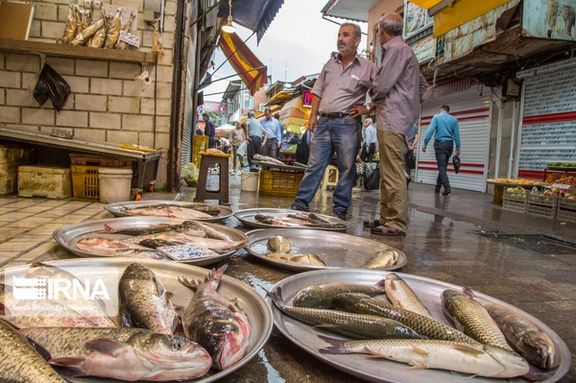
Iranian authorities have blocked the Instagram page of an old man whose singing and dancing videos in public had gone viral over the past days.
The page has been blocked over its “production of criminal content,” Iran’s judiciary said on Thursday. According to reports, all the posts in his Instagram page, with 128,000 followers, were removed.
Iran’s cyber-police has published a new post on his page, warning that it monitors “the criminal activities of the users.” Iran’s clerical regime has become more strict in enforcing their religious laws that do not allow public dancing and singing.
A human rights group identified the old man as Sadegh Bana Motajadded, adding that he formerly served as a fan leader for Sepidrood, a famous football club in the northern city of Rasht, Gilan province.
He found fame a few days ago after some of his videos in Rasht’s fish market went viral. The videos showed him singing and dancing while male and female onlookers joined him by clapping and dancing.
The videos were well received by Instagram users in Iran who thanked the old man for his attempt to make people happy.
On Tuesday, Hossein Hassanpour, deputy chief of Gilan province police, had announced that 12 people were arrested and charged in relation to the release of these videos.
They are accused of “breaking the norms and publicizing it on social and satellite networks,” he said, adding that their recording and publishing the videos of people singing and dancing is an “outrage against public decency.”
Instagram and Twitter users in Iran have strongly condemned the arrests, saying the Islamic Republic is essentially against happiness and hope.

The Iranian Writers’ Association says combatting censorship, a significant tool of suppression, is crucial to safeguarding freedom of speech against government tyranny.
The statement, issued on the Day Against Censorship on December 4 by the long-banned Iranian Writers’ Association (IWA) on Facebook, asserts that censorship has been a decisive instrument over the past four decades to suppress writers, intellectuals, artists, filmmakers, and hinder disapproved social movements and cultural developments.
The IWA's condemnation of censorship extends beyond books and written media to encompass other forms like satellite TV and the internet, enabling the regime to manipulate and mislead society, dismantle independent media, and obscure real information about its oppression, failures, and corruption.
The Iranian regime strictly controls internet access, frequently imposing blackouts during sensitive times, such as widespread protests, and has long restricted access to satellite TV through extensive jamming. The Internet censorship, which began in 2002 by blocking hundreds of websites, later extended to blocking social media platforms. Ten of million of Iranian resort to using VPNs to connect to messaging apps and blocked websites.

Toronto-based journalist and political analyst Jamshid Barzegar told Iran International that the statement, like the statement known as 134 Writers’ Declaration they issued in 1994, can be considered as one of IWA’s “historical statements”.
The 1994 statement marked the revival of IWA's activities after a decade of suppression, condemning the extensive censorship imposed by the regime, demanding freedom of speech for all. Barzgar noted that the recent statement correctly identifies the violation of the right to freedom of speech as a major tool of suppression.
“They have rightly pinpointed the main flaw, the violation of the right to freedom of speech, as one of the major reasons for continuation of the cycle of tyranny [in the Islamic Republic],” Barzgar said.
Members of the association (Kanoon-e Nevisandegan-e Iran in Persian), which was banned two years after the Islamic Revolution of 1979, have been subjected to systematic harassment and persecution for decades.
The IWA named December 4 as Day Against Censorship thirteen years ago in honor of two of its members, Mohammad and Mokhtari Jafar, who were murdered by intelligence ministry agents in 1998 as part of a systematic plan to eliminate intellectuals, political figures, and dissidents.
Tens of dissident politicians, writers, activists, and even academics fell victim from 1988 to 1998 to these systematic murders that were meant to intimidate others into submission by the rulers of the Islamic Republic. The killings came to be known as Iran’s Chain Murders.
Iranian media, politicians and activists have extensively pointed out the similarity between the double murders of filmmaker Dariush Mehrjui and his wife in October this year and the Chain Murders of the 1990s, warning that similar elimination campaigns may have begun again.
In 2021, the American PEN Association awarded Baktash Abtin, Reza Khandan Mahabadi, and Keyvan Bajan with the Pen Freedom Award. According to PEN America’s 2021 Freedom to Write Index, Iran jailed the fourth-highest number of writers and public intellectuals in the world that year. Since then, arrests of writers and other artists have dramatically spiked.

Oberlin College has placed Iran’s former UN ambassador, Mohammad Jafar Mahallati, on indefinite leave from his teaching position after a campaign by Iranian Americans.
Oberlin College spokeswoman Andrea Simakis told Iran International, "On November 28, Professor Mahallati was placed on indefinite administrative leave." She declined to provide reasons for his removal.
According to a statement released on Wednesday, the Alliance Against Islamic Regime of Iran Apologists (AAIRIA) organization announced that “today marks a pivotal development in their campaign. Mohammad Jafar Mahallati, formerly referred to as the 'professor of peace,' appears to have been placed on permanent administrative leave from his role in the Religion Department at Oberlin College. This action comes as a result of tireless advocacy and stark revelations about Mahallati's involvement in covering up human rights abuses and his antisemitic rhetoric, underscoring a long-awaited acknowledgment of the victims' suffering.”
Mahallati reportedly covered up the mass murder of 5,000 Iranian political prisoners in 1988 when he was the regime’s ambassador to the UN.
AAIRIA also disclosed new sexual misconduct accusations against Mahallati during his time as a teaching assistant at Columbia University in the late 1990’s. Iran International was given a copy of a court document showing a settlement in the case.
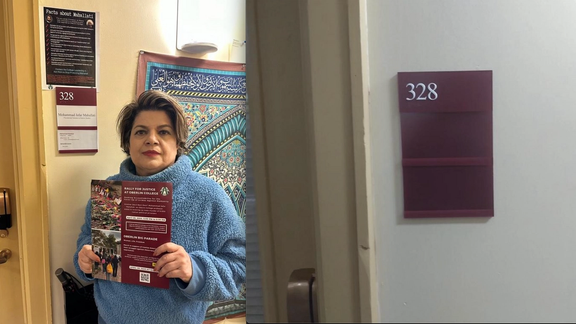
“AAIRIA contacted the school [Oberlin College] after unearthing court documents demonstrating that Mahallati allegedly forced a graduate student into an ‘emotionally abusive’ sexual relationship in exchange for ‘academic benefits,’ while teaching courses at Columbia University.”
AAIRA said that “Sources inside Oberlin College told AAIRIA that Mahallati was placed on permanent leave. His nameplate was removed from his office door, and references to Mahallati were scrubbed from the college’s website, including a ‘factsheet’ that defended the professor from accusations that he covered up crimes against humanity. “
When Iran International clicked on Mahallati’s profile on Oberlin College’s website, it now read “Aw, nuts… Sorry we can't find your page. Let’s try to get you back on track.”
AAIRIA sent Iran International pictures of Mahallati’s office in the religion department, showing his office before and after his ouster. His nameplate no longer appears next to his door as of December 5 when the most recent photograph was taken.
Members of the AAIRA campaign, including its lead organizer, the California-based human rights activist, Lawdan Bazargan, weighed in on Mahallati’s departure.
“It's disheartening that it took Oberlin College three years to take this crucial step,” said Bazargan, whose brother Bijan was executed in the 1988 killings. “We call upon Oberlin College to not only take these actions but also to meet with the family members of the victims to hear their voices and experiences,” she added.
Bazargan continued “Furthermore, we urge the college to demonstrate its commitment to justice by creating a memorial for the victims. This is not just about accountability; it's about honoring the memory of those who suffered in the 1980s and the 1988 massacre and ensuring that such atrocities are never forgotten."
“This development, however, should not be mistaken for swift or decisive action by Oberlin College,” said Fatemeh Pishdadian of AAIRIA, whose parents were tortured and executed by Iran’s regime in 1981. “It reflects a belated response to pressing demands for truth and justice which continued for years, echoing our call that those who shield the actions of oppressive regimes have no rightful place in our academic institutions.”
Investigative journalist Ben Baird, who uncovered the sexual harassment case against Mahallati, told Iran International “Mahallati isn’t just involved in human rights abuses and possible antisemitic teachings – he was also the defendant in a lawsuit alleging a predatory sex-for-grades relationship with a graduate student at Columbia University, where Mahallati taught courses in the 1990s. “
Baird added “Columbia settled the case with the plaintiff, Vida Shammas, for an undisclosed amount. However, the case files detailing the sordid nature of the affair, including Mahallati’s alleged attempts to blackmail Shammas if she told anyone about the quid pro quo, sat buried in government storage for decades, obstructing access to evidence of Mahallati’s potential academic malpractice.”
Mahallati did not immediately return Iran International press queries sent to his two Oberlin College emails and his personal email.
Frieda Fuchs, an Oberlin-based member of AAIRA, who has taught at the college, told Iran International “Oberlin College exhibited a significant oversight in appointing Mahallati to a tenure-track position in the Religion Department. Prior to his hiring, the institution should have considered Mahallati's role in concealing the 1988 prison massacre as a UN Ambassador, his support for UN resolutions condemning Israel, his failure as UN Ambassador to condemn the persecution of Jewish and Baha’i minorities in Iran, and his endorsement of the fatwa against Salman Rushdie.
She went on to say, “Additionally, Mahallati sought to use diplomatic immunity in 1998 to evade sexual harassment charges at Columbia University, resulting in a settlement. All this information, publicly accessible, should have warranted appropriate action.”
AAIRIA wrote that “We demanded Mahallati’s immediate termination after an Amnesty International report identified him as a chief conspirator in the Iran regime’s attempts to hide the 1988 massacre of an estimated 5,000 political prisoners. In late September, the Department of Education Office of Civil Rights revealed that it was investigating a complaint that Mahallati taught students ‘support for Hamas and terrorism’ as part of a larger probe into anti-Semitism on Oberlin’s campus.”
AAIRA, a broad-based coalition of families of the 1988 massacre victims, human rights activists, and concerned citizens, noted in its statement that it demands that Oberlin College “clarify the rationale behind Mahallati's leave and initiate an independent investigation into the oversight of his hiring, given his alleged complicity in the 1988 massacre. The college must also ensure that Mahallati is denied any future benefits, pensions, or favorable references stemming from his work at Oberlin College.”

Amnesty International has released a report exposing the Iranian government's use of rape and sexual violence as tools of repression in last year’s protests.
The 120-page report titled “They violently raped me: Sexual violence weaponized to crush Iran’s Woman, Life, Freedom uprising,” refers to the popular revolt against the Islamic Republic sparked by the death of 22-year-old Mahsa Amini at the hands of the so-called morality police. The recurring nationwide protests that started in September 2022 lasted for months until the regime crushed the dissent by killing about 600, arresting over 22,000 and hanging some of protesters.
The new report published Wednesday documents in detail “the harrowing ordeals of 45 survivors, including 26 men, 12 women and seven children, who were subjected to rape, gang rape and/or other forms of sexual violence by intelligence and security forces following their arbitrary arrest for challenging decades of oppression and entrenched gender-based discrimination.”
Sixteen of the 45 survivors whose cases were documented in the report were raped, including six women, seven men, a 14-year-old girl, and two boys aged 16 and 17. Six of them – four women and two men – were gang raped by up to 10 male agents.
The victims faced sexual violence at the hands of various branches of the Iranian security apparatus, including the Revolutionary Guards, Basij paramilitary force, Intelligence Ministry, and different police branches in more than half of Iran's 31 provinces. The survivors' testimonies paint a disturbing picture of rape and sexual violence, with victims subjected to unimaginable brutality, including the use of wooden and metal batons, glass bottles, hosepipes, and even electric shocks.
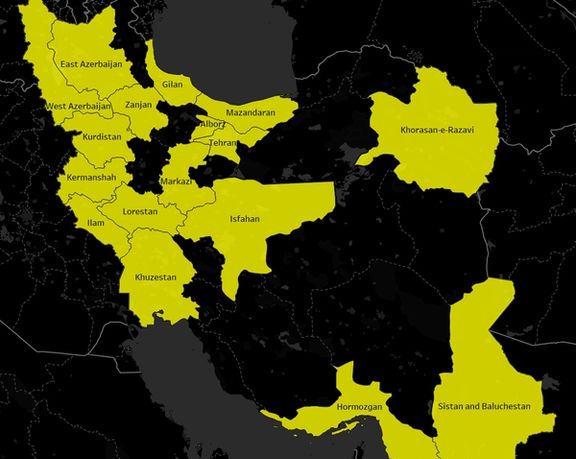
Criminology expert Moein Khazaeli said in an interview with Iran International that the report provides damning evidence that sexual violence is systematic in Iran. The perpetrators are either directly ordered by superiors to engage in such acts or their actions are intentionally ignored by the government, indicating that “sexual violence is used as tool for repression.”
Despite earlier reports of a pattern of widespread sexual violence as a means of torture and intimidation, the Iranian authorities have never charged or prosecuted anyone for such crimes. The report highlighted that the lack of accountability has left survivors grappling with physical and psychological trauma, many unable to seek justice domestically due to the fear of reprisals.
“I used to be a fighter in life. Even when the Islamic Republic tried to break me down, I carried on. However, recently, I think about suicide a lot," said Sahar, a Baluchi woman who recounted the traumatic impact of sexual violence at the hands of security forces, who removed her clothes and touched her breasts and genitals while mocking her body and skin color and threatening her with rape.
Human rights activist Reza Akvanian told Iran International the primary force that push numerous survivors to commit suicide after their release is the profound psychological trauma inflicted by the Islamic Republic’s forces.
Another woman, Zahra, told Amnesty International that, while in a van belonging to the Special Forces of Iran’s police (yegan-e vijeh), an agent pulled down her trousers in the presence of other female detainees and raped her. She added that she witnessed another agent ordering two handcuffed women in the van to perform oral sex acts on him and, when one woman refused, he dragged her out of the van by her hair.
Amnesty International's Secretary-General Agnés Callamard emphasized how survivors have been left without recourse, trapped in a cycle of institutionalized impunity, silencing, and enduring deep physical and psychological scars, pointing to “a wider pattern in the use of sexual violence as a key weapon in the Iranian authorities’ armory of repression of the protests and suppression of dissent to cling to power at all costs.”
“Iran’s prosecutors and judges were not only complicit by ignoring or covering up survivors’ complaints of rape, but also used torture-tainted ‘confessions’ to bring spurious charges against survivors and sentence them to imprisonment or death,” Callamard stated.
Amnesty International urged the global community to stand with the survivors and pursue justice, including through supporting the extension of the UN Fact-Finding mission on Iran to ensure an independent mechanism for collecting, preserving, and analyzing evidence of crimes under international law. The rights group also urged states to initiate criminal investigations against suspected perpetrators under the principle of universal jurisdiction, stressing the need for international arrest warrants.
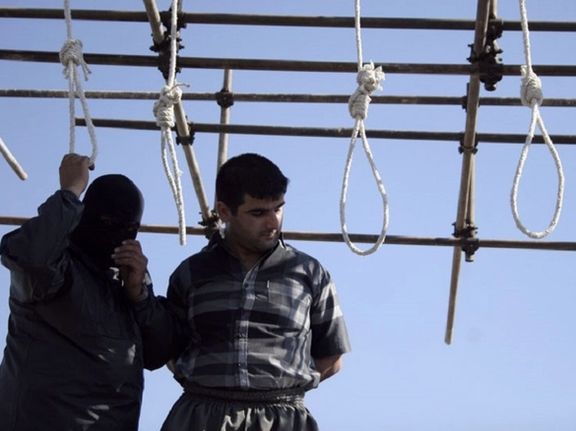
Four prisoners were executed at jails in Iran on Wednesday, as the Islamic Republic added to its toll of hundreds of lives taken in capital punishment this year.
Zabihollah Arjmand, 35, was hanged in Dehdasht Central Prison, according to US-based Human Rights Activists News Agency (HRANA).
He had been arrested in 2019 on charges of drug trafficking and subsequently sentenced to death.
Two Kurdish prisoners, Khaled Rouhi and Sirous Heydari, were executed in Sanandaj Central Prison, on charges of murder.
Human Rights Organization Hangaw reported that Heydari had been sentenced to death 12 years ago, while Khaled Rouhi had been condemned to death four years ago.
A prisoner in Saqqez Central Prison was also executed, having been sentenced to death on rape charges.
United Nations Secretary-General Antonio Guterres reported to the General Assembly in October on human rights violations in Iran. He warned that at least 419 executions had been carried out in the first seven months of the year alone in Iran, a shocking rise of 30 per cent over the same period in 2022. More than half of those sentenced to death had been found guilty of charges related to drug crimes.
The Iran Human Rights Organization reported on Thursday that the number of executions carried out by the Islamic Republic since the beginning of this year has reached 707 individuals, marking an unprecedented increase over the past eight years.